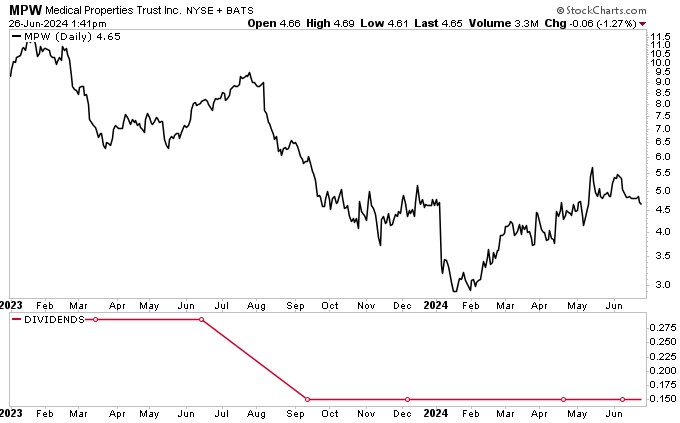Medical Properties Stock: Beaten-Down 12.7%-Yielder Has 115% Upside

Lots of Reasons to Be Bullish on Medical Properties Stock
Real estate investment trusts (REITs) have taken a hit within this high-interest-rate environment. That’s because higher rates increase the cost of capital and cut into earnings.
But with rate cuts expected to begin in the coming months, now is a good time to consider an overlooked and, according to Wall Street analysts, wildly undervalued stock, Medical Properties Trust Inc (NYSE:MPW).
A global health-care REIT, Medical Properties Trust is the second largest non-government owner of hospitals in the world. The company has total assets of approximately $17.4 billion, including $11.3 billion in general acute facilities, $2.4 billion in behavioral health facilities, and $1.7 billion in post-acute facilities. (Source: “Overview,” Medical Properties Trust Inc, last accessed June 26, 2024.)
As of March 31, 2024, Medical Properties Trust’s portfolio included 436 properties and approximately 43,000 licensed beds leased to or mortgaged by 53 hospital operating companies across the U.S. as well as in the U.K., Switzerland, Germany, Spain, Italy, and Portugal.
That portfolio is always changing. In the first quarter, the REIT completed the sale of five hospitals in California and New Jersey for $350.0 million and commenced rents at development properties in Texas and Spain. This past April, Medical Properties Trust sold a 75% interest in five Utah hospitals for total proceeds of $1.1 billion.
For-profit health care doesn’t always lead to profits though. Even Medical Properties stock experiences the odd bump in the road.
This past May, Steward Health Care, one of the REIT’s operators, filed for bankruptcy protection. It put all of its 31 U.S. hospitals up for sale, in an effort to address its $9.0 billion in debt. (Source: “Bankrupt Steward Health puts its hospitals up for sale, discloses $9 bln in debt,” Reuters, May 7, 2024.)
Due to financial strain, Steward has fallen behind in paying its rent to Medical Properties. The hospital system owes the REIT nearly $1.0 billion. A bankruptcy judge will decide how much of that Medical Properties Trust will actually get.
Now, before you go thinking that Medical Properties is a callous landlord shutting down hospitals, it’s important to note that rent payments under the REIT’s hospital leases represent only a small percentage (single digits) of the hospital’s total sustainable reimbursement revenue. (Source: “MPT Corrects the Record,” Medical Properties Trust Inc, last accessed June 26, 2024.)
In its filing with the U.S. bankruptcy court, Steward actually declared that its ballooning debt was a result of patient mix and lagging reimbursement rates, declining patient visits and revenue, and sharp increases in labor costs. Its Chapter 11 filing does not cite rent as a core contributing factor to its eroding earnings and liquidity.
Steward has said that it is looking for third-party capital that will be used, in part, to pay for its outstanding debt to Medical Properties, but there is no guarantee that the former will be able to successfully execute on its plan or that the latter will recover all of its deferred rent.
First-Quarter NFFO of $0.24
Right now, Medical Properties stock is a work in progress, in large part because of uncertainty surrounding Steward’s filing for Chapter 11 bankruptcy.
In the first quarter, the REIT reported a net loss of $736.0 million, or a loss of $1.23 per share, compared to net income of $33.0 million, or $0.05 per share, in the same period last year. (Source: “Medical Properties Trust, Inc. Reports First Quarter Results,” Medical Properties Trust Inc, May 9, 2024.)
The net loss includes approximately $693.0 million, or $1.16 per share, worth of impairments, primarily non-real estate adjustments related to Steward Health Care, which Medical Properties has said it is committed to pursuing.
Medical Properties Trust’s normalized funds from operations (NFFO), a term used by REITs to define cash flow from operations (and used to pay for dividends), was $142.0 million, or $0.24 per share, down from $222.0 million, or $0.37 per share, in the same prior-year period. The lower NFFO was mainly a result of the decrease in revenue from Steward.
As noted above, during the first quarter, Medical Properties began collecting rent at development properties in Texas and Spain. Subsequent to the end of the first quarter, the REIT completed the sale of five hospitals in California and New Jersey and sold a 75% interest in five Utah hospitals.
Commenting on the results, Edward K. Aldag, Jr., the REIT’s chairman, president, and chief executive officer, said, “We continue to execute a capital allocation strategy that we now expect will exceed our initial target of $2.0 billion in liquidity transactions in 2024. This strategy has repeatedly validated MPT’s approach to underwriting, demonstrated strong market demand for real hospital assets and provided immediate capital to reduce our debt.”
Aldag continued, “Regarding Steward’s recent filing for Chapter 11 bankruptcy, we expect this process may facilitate an orderly transition of Steward’s operations to new operators. As Steward continues these efforts, MPT has agreed to provide $75 million in DIP [debtor-in-possession] funding to ensure continued operations and continuity of patient care.”
Medical Properties Stock Maintains Quarterly Dividend of $0.15 Per Share
Despite troubles with Steward Health Care, Medical Properties Trust’s other hospitals are generating cash, which is helping fuel its dividend. In May, Medical Properties stock paid out a quarterly cash dividend of $0.15 per common share, or $0.60 per share on an annual basis, for a forward yield of 12.74%.
MPW Stock Has 115% Upside Potential
Medical Properties stock’s big 12.7% yield is primarily a result of the company’s deteriorating share price, which, as of this writing, is down 42% over the last 12 months. That said, MPW stock is showing signs of life, up 60% since February.
That could be just the beginning, too. Medical Properties stock has taken a hit due to financial struggles with Steward Health Care. Higher interest rates certainly haven’t helped either.
To beef up its balance sheet, Medical Properties Trust sold off certain properties and slashed its dividend by 50%. Thanks to its improved liquidity, it has been able to refinance some of its debt. The company is also well on its way to exceed its initial target of $2.0 billion in liquidity this year.
These actions have helped buoy sentiment on Wall Street, with analysts expecting Medical Properties Trust stock to swing to a full-year 2024 loss of $0.66 per share before climbing to a $0.42-per-share gain in 2025.
This has also juiced share price expectations, with analysts providing a 12-month average forecast of $5.86 per share and a high estimate of $10.00 per share on Medical Properties stock. This translates into potential gains in the range of 26% to 115%.

Chart courtesy of StockCharts.com
The Lowdown on Medical Properties Trust Inc
Medical Properties stock is a great REIT with a strong balance sheet and growing international portfolio. Unfortunately, the company’s share price has taken a big hit due to one of its biggest clients filing for bankruptcy.
The REIT cut its dividend to shore up cash, but because of its strong NFFO generation, it seems unlikely that additional dividend cuts are on the table.
Most importantly, Medical Properties Trust has improved its financial health and refinanced debt. The company is also looking to recoup some of the millions of dollars it’s owed by Steward Health. This hasn’t gone unnoticed, with conservative Wall Street analysts providing strong guidance over the next year.
On top of that, Medical Properties stock has strong institutional ownership, with 691 institutions holding 74.9% of outstanding MPW shares. The two biggest institutional holders are BlackRock Inc, with a 15.7% stake, and The Vanguard Group, Inc., with a 15.5% interest.
Medical Properties stock might be a good REIT for contrarian investors to keep an eye on. Shareholders willing to be patient could see the REIT’s share price make a significant recovery, all while being on the receiving end of an ultra-high-yield dividend.











